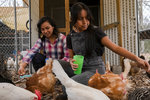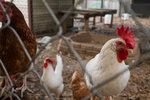BOX INFO:Want to learn how to raise your own chickens for eggs?McCrea is the author of “The Chicken Whisperer’s Guide to Keeping Chickens,” available on Amazon.In March, she also …
This item is available in full to subscribers.
Please log in to continue |




Yes, the price of eggs has gone through the henhouse roof.
In fact, it has more than doubled.
In late December, CNN reported that Midwest large eggs, the benchmark for eggs sold in their shells, hit $5.46 per dozen. During the same week in 2021, one dozen sold for roughly $1.70.
The easy response is to blame the large and vague umbrella of inflation. But the jump is due to two distinct reasons: disease and the cost of chicken feed.
Brigid McCrea, who has a Ph.D. and is a small flock poultry extension specialist with the Alabama Extension Service, said avian influenza recently hit the nation’s chicken population especially hard. The outbreak began in February 2022 and persisted through much of the year.
Nationwide, about 60 million birds have died because of the disease so far, according to the U.S. Department of Agriculture. Of those, about 43 million were egg-laying hens, according to USDA data provided by the American Egg Board, a farmer-funded group that markets eggs.
No instances of avian influenza have been recorded in commercial poultry farms in Alabama.
“Yet,” McCrea cautioned. “Tomorrow is another day.”
The disease has, however, found its way into the state’s wild bird population, meaning it could easily jump from wild flocks to caged poultry. And because Alabama’s egg farms sell to distributors, not local stores, the state’s solid egg production is not enough to keep Alabama households from feeling egg prices crack.
The jump in price has sent many people searching for eggs grown closer to home, in backyards, family farms and as 4-H projects.
McCrea said she was pulling eggs out of her own coop last weekend when she saw a passing truck hit the brakes.
“You know when you can see something happening in slow motion? I just laughed. I knew what he was going to ask,” McCrea said.
The driver shouted across the yard, “Are you selling your eggs?”
McCrea doesn’t sell her eggs. In fact, she said, to charge a fair price for the cost of raising chickens, she would have to charge him far more than the grocery store.
“I don’t want to break somebody’s heart like that, but some people are just giving their eggs away,” she said. “You can’t charge $2 a dozen and think you’re going to re-coop any of the cost.”
In Robertsdale, Williams Creek Farm is one of a handful of Baldwin County based farms that raise hundreds of chickens and are able to sell them at a more reasonable rate than small backyard farmers.
Owner Alicia Maria Williams said her family started the farm in 2019 as a homeschool project with 12 chicks. Now, they raise well over 200 birds both for meat and eggs.
Williams said she didn’t realize how much grocery store prices had jumped until there was a line out her door. The farm now maintains an egg subscription service, filling egg cartons of prepaid customers first. There is a wait list to join.
Their hens typically give them 70 eggs a day. But chickens, she said, “can be sketchy.”
“It depends on the breed. For some of them, it depends on their mood,” she said.
On social media, there has been a flurry of interest not just in locally raised chickens but in learning to raise chickens.
But McCrea cautioned for would-be chicken owners to do their homework first.
“You can’t raise chickens the way our grandparents did,” McCrea said. “The disease landscape has changed and will quickly call your bluff.
“If you’ve done less than 20 hours of research, then you haven’t done enough homework on raising chickens,” she said.
She stressed that new chicken owners who can’t attend a class should start their journey online with the local cooperative extension office, aces.com.
“Your responsibility is to provide the best possible conditions for your birds," she said. "Otherwise, it’s unethical."